Can you freeze sourdough bread dough? Although there are many opinions on this topic, you absolutely can freeze your sourdough bread dough to bake later. It’s a great way to prep ahead and still have freshly baked bread when you are craving it.

I’ve had a lot of people ask me if it is possible to freeze sourdough dough. Especially lately with the holiday season coming up. We all need easy ways to simplify this busy time of year.
While this is not something I typically do, I thought it would be a fun topic to explore.
At the farmhouse, I’m more apt to either freeze the baked bread itself (my favorite method), or I’ll keep my dough in the fridge for up to 5 days after shaping. You can see how I do that in my once a week sourdough bread routine here.
If you won’t be baking your bread by day 5, it’s best to stick the dough in the freezer instead. Fresh sourdough bread freezes super well and so does the dough.
So, how do you actually freeze the dough for the best results?
Why Freezing Dough Is A Good Idea
Convenience: Perfect for holidays, special occasions, or meal prep. It is a fantastic way to make life a little bit easier. It makes the busy holiday season way easier when you get a step ahead.
Delicious: Who doesn’t love homemade sourdough bread right out of the oven?
Save time: I love making double and triple batches of sourdough bread dough. Not only does it save time, but it also saves dishes, which again saves time.
How To Freeze Sourdough Bread Dough
You can freeze your bread dough at a few different stages.
Create the dough:
Follow the instructions on your sourdough recipe. Make the dough and then allow it to bulk ferment. This is the first main fermentation. Typically it takes about 8-12 hours. It should be about double in size.
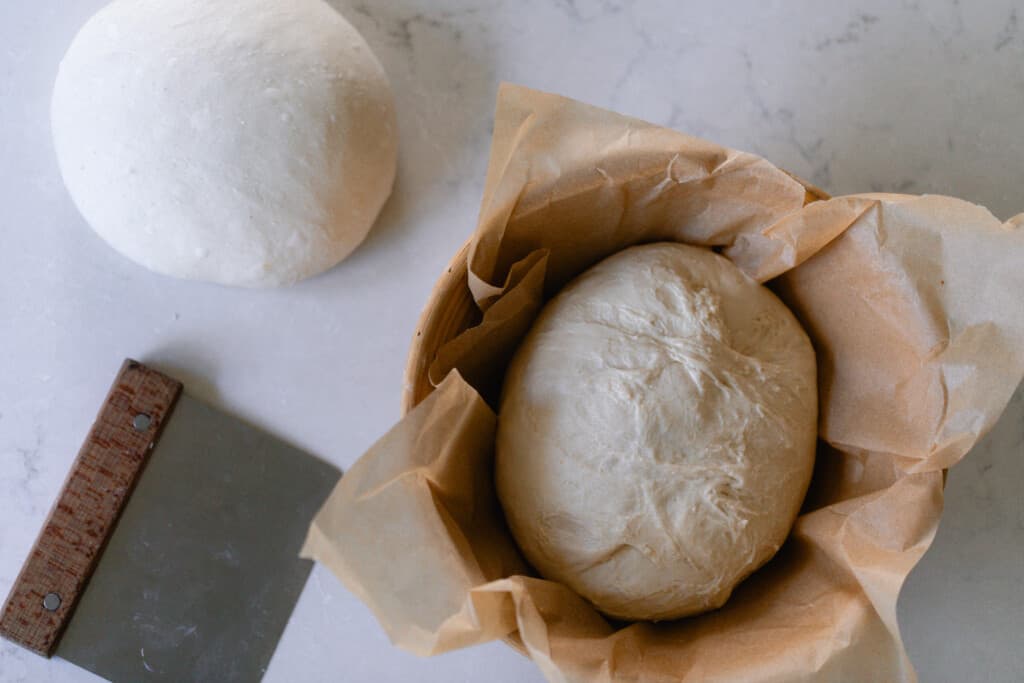
Shape the dough:
After the bulk fermentation, shape the dough as desired.
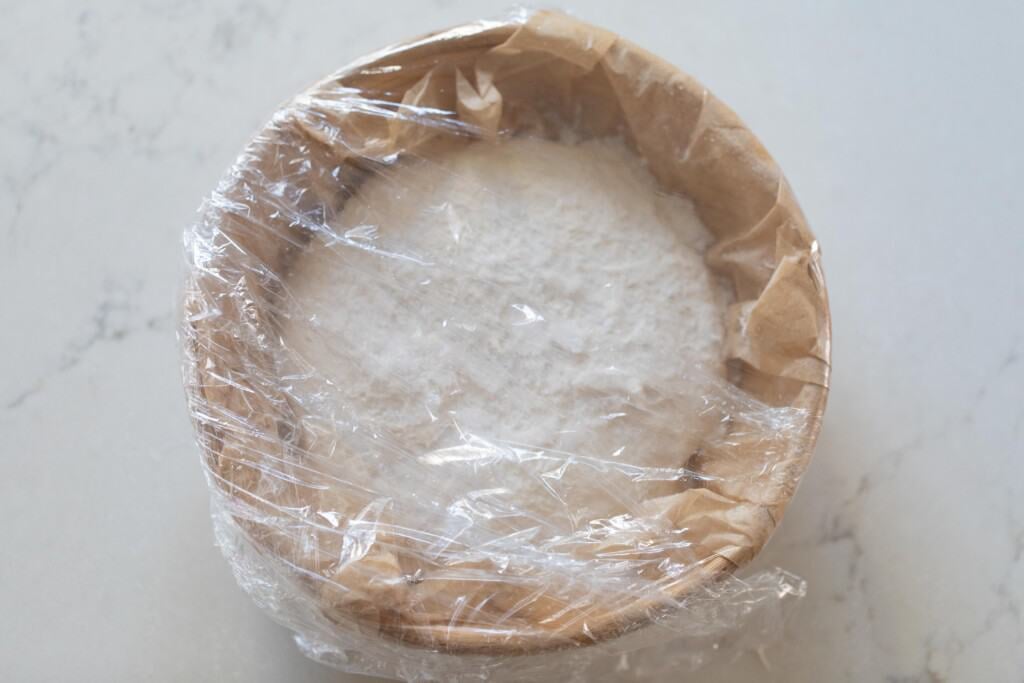
- For a boule: Line a banneton basket or bowl with parchment paper. Put a little oil on the parchment. (I prefer coconut oil or avocado oil.) Add the dough, cover with plastic wrap or a lid and place in the freezer. Freeze until solid.
- For rolls or sandwich bread: Line the baking dish or loaf pan you plan to use when baking with parchment paper. Add a little oil. Shape the dough however desired and add to the baking dish or pan. Cover with plastic wrap or lid and freeze until completely frozen.
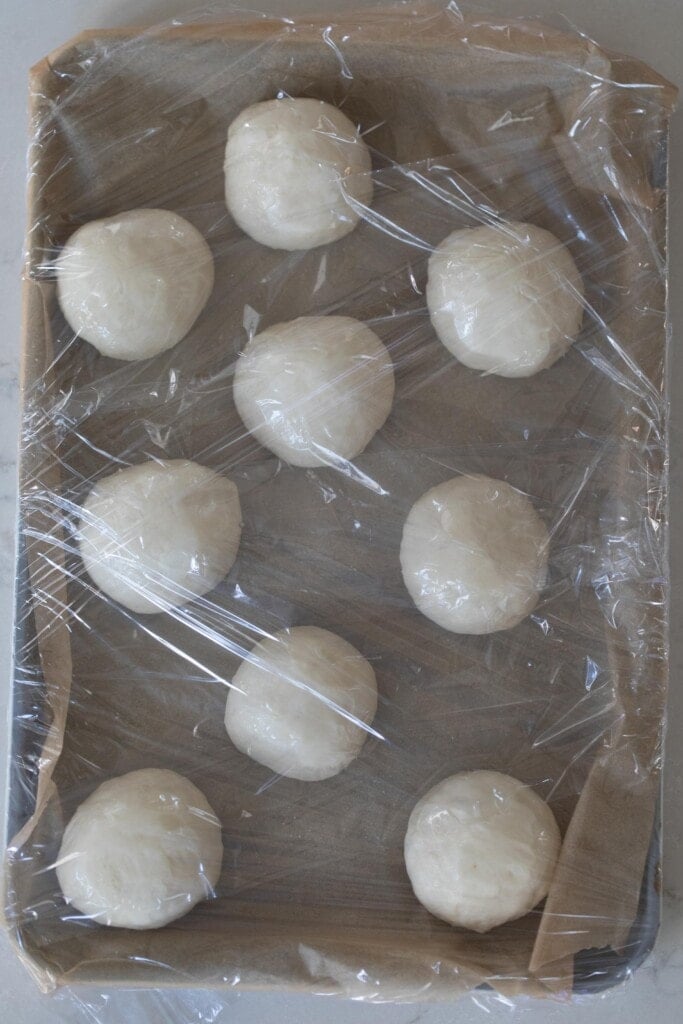
Store:
Once the dough is completely frozen, transfer the frozen dough into a freezer safe bag (like a ziplock bag) or other airtight container, if desired. For rolls or sandwich bread, you could leave it in the baking dish it is in, if preferred. I like to transfer it so it frees up my baking dish for other things. Remove as much air as possible. Label and date the container.
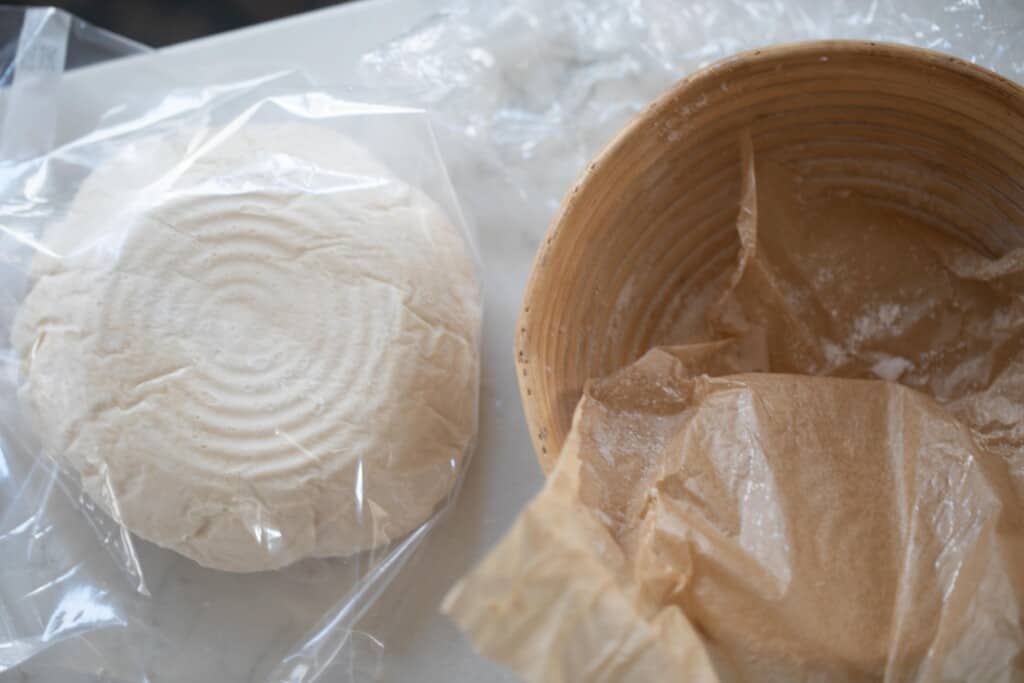
Thawing Frozen Sourdough Bread Dough: Final Proof
Remove the dough from the freezer (for rolls and sandwich bread, place in the desired baking dish, and for a boule, place the frozen bread back in a floured banneton or a bowl lined with a floured tea towel) and place at room temperature for a few hours until it has doubled. You can also place in the refrigerator at least overnight or for a day or two. When thawing at cold temperatures, the bread doesn’t tend to double in size in the fridge, but bakes fine. It’s like magic. It looks like nothing is happening, but it bakes up fluffy and beautiful.
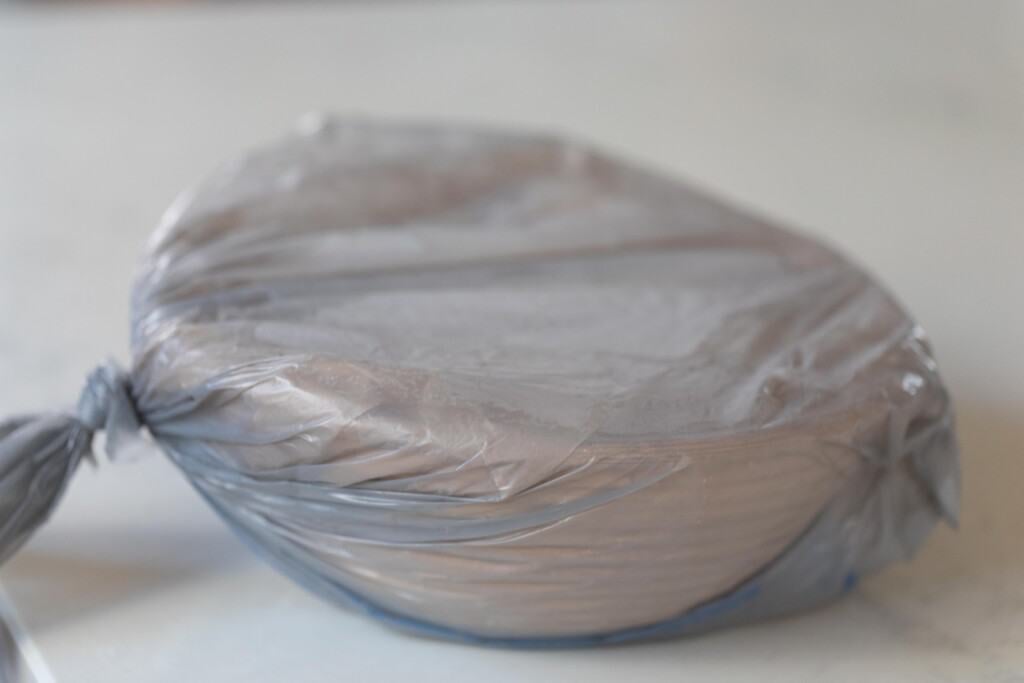
Bake:
Bake the bread according to the instructions of your recipe.
Additional Tips:
- As with freezing anything, the key to getting the best quality is avoiding freezer burn. To do so, make sure your dough is wrapped well and is as airtight as possible.
- I’ve talked about this a lot, but I have always found sourdough to be very forgiving. Plus, the perfect loaf of sourdough bread is really up to each person’s interpretation. So, don’t be afraid to experiment here. What works well for one person may not for the next. That’s okay!
- The texture of the bread that has been previously frozen does have a slightly different texture than fresh bread that hasn’t been. But it is still lovely and delicious.
- I have found it very helpful to spray the parchment paper or plastic wrap with avocado oil or rub it down with coconut oil to keep the dough from sticking to the parchment while freezing boules, rolls, buns and pizza dough.
This post contains affiliate links, which means I make a small commission at no extra cost to you. See my full disclosure here.
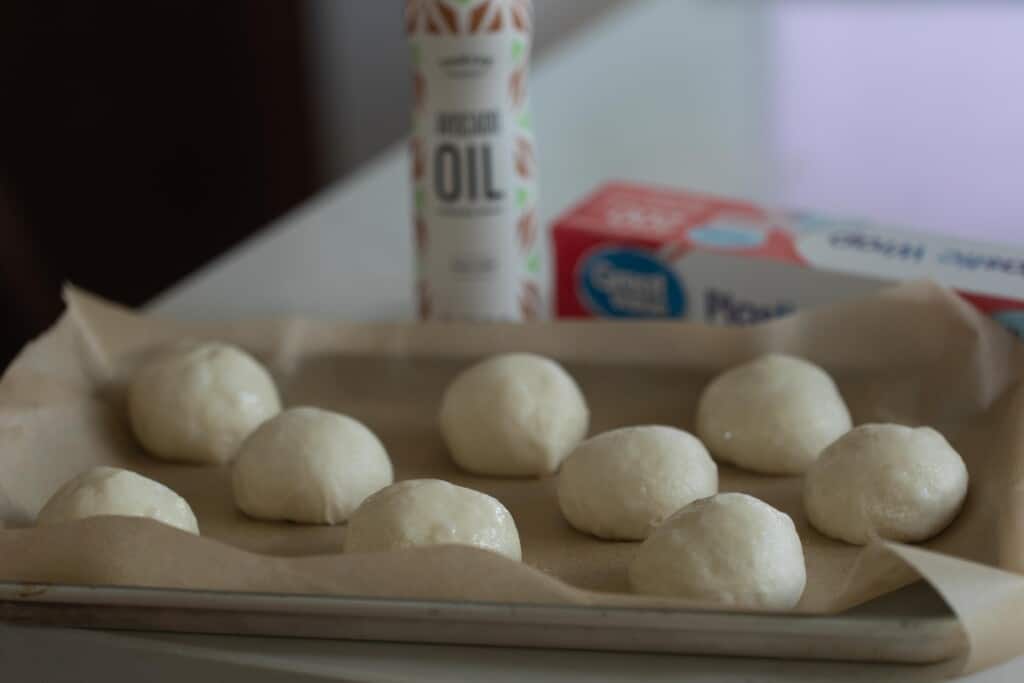
Tools you may need
Banneton basket
Plastic wrap
Plastic bag or aluminum foil
Other sourdough doughs you can freeze:
Bread dough is not the only thing you can keep in the freezer to bake in a pinch. Here are a few of my other favorite sourdough doughs to keep on hand in the freezer.
Pizza dough
One of my favorite doughs to freeze is actually my Sourdough Pizza Dough. I love having this easily on hand for a busy weeknight meal.
To freeze the pizza dough, I let it rise and divide the dough. Then, I’ll wrap it really well in plastic wrap and place it in an airtight freezer bag, making sure to get as much air out as possible. If wrapped well, the pizza dough can be in the freezer for a couple of months. Once you are ready to make your pizza, you can simply get the dough out of the freezer and let it thaw either in the fridge or at room temperature. Roll it out and proceed with the baking instructions here.

Cookie Dough
Cookie dough using sourdough discard is another great dough to freeze and have on hand for future use. After all, you never know when your sweet tooth will be craving a treat!
I like to keep some of my sourdough chocolate chip cookie dough in the freezer, so I can easily bake for a quick dessert or if we are expecting company.
All you have to do is make the dough according to the directions here (either long fermented or quick version). Then, you’ll shape your cookies into balls and put them on a baking sheet with parchment paper.
Flash freeze the balls of dough for a couple of hours or until frozen completely.
Transfer your dough balls to an airtight container and place them back in the freezer for up to three months.
Once you are ready to bake, pop them out of the freezer, preheat your oven, and bake!
FAQ
How long can you freeze sourdough dough?
Frozen sourdough dough can last up to a month in the freezer.
At what stage can you freeze sourdough bread dough?
Technically, you can freeze the dough at any stage along the way, thaw, and restart the process at a later date. For best results, freeze after the bulk rise and shaping.
How do you defrost sourdough dough?
Defrost in the fridge or on the counter. If freezing on the counter, allow the bread to thaw and double in size. If defrosted in the fridge, it will not double in size no matter the amount of time it sits.
What happens if you freeze sourdough starter?
There are many ways to keep a sourdough starter when you are unable to keep up with feeding and maintaining it for a longer period of time. One way is freezing the sourdough starter itself. Don’t worry – it won’t kill off the wild yeast if done correctly. Check out my post here on how to freeze your sourdough starter for later use.
More Sourdough Tips From the Farmhouse
How to Store Sourdough Bread To Keep It Fresh
Can You Freeze Sourdough Starter?
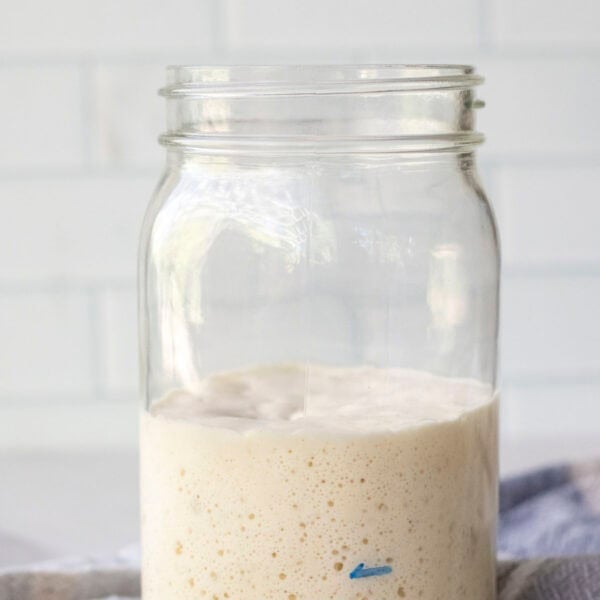









Very helpful information. Thank you.
I froze a tin of the sourdough dinner rolls after bulk fermentation and shaping. Took them out yesterday, defrosted at room temperature until they doubled, but they did not rise when I baked them. In reading through this article, I think my problem was the length of time they were in the freezer, two months, and they were not airtight. Could that be why?
It’s possible!
I have tried freezing the dough several times with inconsistent results. Sometimes, out of the freezer, the dough raises beautifully, but more often, the loaf thaws and stays small without rising. It still tastes good, but is dense and brick-like.
I have tried adding a bit more flour for food, and also, a bit more starter. Any thoughts?
Thank you.
Hmm. That’s interesting. Are you letting the dough rise at all before freezing it? Sometimes it takes longer to rise, so it could take a bit longer to achieve the rise.
Thanks for responding, Lisa!
Yes, each time I let the dough rise before freezing. Maybe too much? I do the full fermentation on the counter that includes 4 “folds”, then usually separate the dough into loaves, bake one, put one in the fridge and freeze one.
Can you do hamburger buns, pie crust and etc?
Thanks for this! If you’re doing bulk
Ferment and shaping into a banneton and then freezing, when do you take it out of the banneton and score? Do we leave it to thaw completely, flip, and score? Thanks
I would leave it to thaw completely, then flip and score.
Thanks! Mine turned into a nice frisbee after thawing and baking. It’s my first sourdough frisbee, but not at all my first Boule. 😂 can you help me troubleshoot? I let it thaw in the fridge overnight, then set on the counter for about 2 hours before flipping and scoring. It was still cold when scoring, not sure if that matters, but mentioning in case it does. I’m trying again with another right now. This time, thawing at room temp.
Hmm. Did it get all the time it needed to rise?
Hi. Just starting out trying sourdough. Thank you for all the useful info. Still a little confused on how long starter takes to mature and does it have to be mature before freezing or putting in the fridge. But my burning question is is there a secret way to wash containers where it is very dried on? Thanks again. Have a great day.
Around 7 days, although it will continue maturing each time you feed it and bake with it.